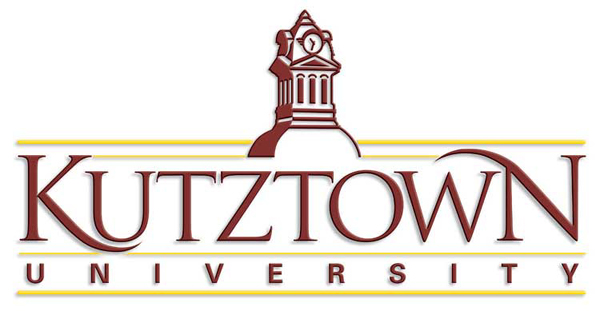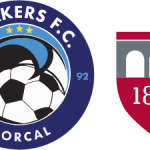KUTZTOWN, PA – KUDOS, Kutztown University’s Dedication to Outstanding Service, focuses on university administrative offices and the individuals within them, giving the campus community a look inside the working areas on campus.
This week, University Relations (UR) sat down with the Office of Dining Services to get an inside look at the dedicated individuals who take care of KU’s students by preparing and serving healthy meals to nourish and energize students every day.
UR: Would you introduce yourselves and tell us how long you’ve been with KU?
KD: My name is Kent Dahlquist. I’ve been at Kutztown University since 1992. I am the director of Housing and Dining Services.
AF: I’m Amanda Fretz. I’m the associate director for Housing and Dining and I’ve been at KU since 2002. I started as a student and then I moved into a professional role in 2006.
UR: What is your department’s role and mission at the university?
KD: We’re responsible for housing and feeding our students. We’re responsible for all aspects of dining whether it’s catering, feeding the students and the university community in our all-inclusive, “all you care to eat” facilities or our retail locations.
AF: We work with both the housing and the dining program, but more particularly about the dining program, our role is to make dining an experience for our students. We do not want just a place to eat, but somewhere students can enjoy themselves. We’re all about making the students experience whole. That incorporates their dining experience on campus.
UR: Can you explain your department’s staff make-up and responsibilities?
KD: In addition to myself, I have an associate director, Amanda Fretz, and I also have an assistant director, Cody Moyer. We oversee all the housing processes and the facilities. We manage everything related to dining, including the facilities. We contract with Aramark, our dining vendor. They have a management team on campus as well as an appropriate labor crew: chefs, sous chefs, caterers, laborers. We don’t really tinker with the menus that much. They’re the experts, so they put together the menus. It’s a rotating menu. Every 3-4 weeks, you’ll see them cycling through different menus items weekly.
AF: We have a director, who oversees the entire department. Myself, as the associate director, I work behind-the-scenes with the technology of meal plans and sales, and we have an assistant director who also works behind the scenes with meal plans and sales and also does a lot of the programing in the facilities for our students. We have some clerical support staff. We all work alongside our dining vendor, which is Aramark. They do all of the execution work; making the menus, getting the food on the table, to making sure things in the dining hall happen. We do a lot of the behind the scenes to make sure students have access to their meal plans and developing what that is, taking care of facility issues, things like that.
UR: How does your department serve students and the campus community?
KD: In addition to feeding and housing students, we’re also responsible for the upkeep of the buildings. We work very closely with the facilities department as it relates to maintenance work, renovations and new construction. We went through a full renovation of the Cub Café in 2015. That included an expansion, additional seating, creating a food-serving environment where the food is prepared in front of our students, so they’re getting it fresh. It’s an “all you care to eat” facility and provides multiple seating environments. The South Dining Hall, our downstairs area, the food court, was renovated in 2016 as well. The main reason for the renovations was to introduce our new meal plan program, My-Time Dining.
AF: We serve students in the role of dining really to make their dining experience an experience. When I went to school and through college, dining was just to go and eat. I went, I ate, I left. It was just part of the day. Very cafeteria-like. We have really worked over the last five years to make it an experience for students, a place where students want to go outside of their room. You can only spend so much time in your residence hall or in your apartment. We wanted to give students a space outside of their halls and dining allows that. We create programs that make it an experience, a reason to want to come to our facilities and to experience the social aspect.
UR: What are the points of pride in your department?
KD: Obviously, the meal program is one of our largest points of pride. I really think the feather in our cap for us and the university is the meal program. We are one of a handful of universities in the country that offer a true 24/7, unlimited access meal program to our students. It costs our students around $16.32 per day to have access to food 24 hours a day, unlimited access to both residential dining areas. If they want to come in 15 times a day, Cub Café or South Dining Hall, they’ll be able to do that. When we renovated the South Dining Hall, we also wanted to create an environment that was engaging to our students. When you think about being at home for a family meal, you’re in the kitchen, in the dining room area, in the living room, gathering with all of your friends and family. We want the same environment. We want the students to feel comfortable to come down to the South Dining Hall or the Cub Café to be able to just sit and enjoy the time with their friends and their peers. So, in the South Dining Hall, you’ll see that we’ve introduced billiard tables, foosball, shuffleboard. We have a gaming room with an Xbox and PlayStation. There’s the Cyberlab, where computers are available to our students. We have a stage. We also do entertainment in that location. We have a 10-foot fireplace that’s on year-round. It really tries to give them a place that they would want to go to and just hang out, not necessarily to eat. That’s what our goal was.
AF: Our biggest point of pride is the implementation of My-Time Dining. We spent a lot of time in meetings and talking to students to get the big picture on what students wanted. We had the big re-vamp five years ago and the continuation building on to that program. We wanted to make sure it wasn’t a program we just created and then never followed through on. We spend time each year re-evaluating it, making sure it’s what our students want, making sure our students are getting the best value from the program, both monetarily and as a student experience. I think that’s our point of pride. We are the only institution in the State System that offers My-Time, 24/7 access to our students; It is a pretty special feature.
UR: What would you like people to know about your department that they may not know already?
KD: I think there’s a lot of offices that know what a good team player we are for the university. We like to be actively involved in all aspects of the university. Whether we’re interacting with an academic or assisting the student union building in a project they’re working on, we believe that our outreach goes well beyond housing and dining. We have the same vested interest as all the other departments on campus – that’s the success of our students, the success of the university and watching our students go across that graduation stage. I think that for some, we might be seen as a well-kept secret and they haven’t had the opportunity to interact with us yet. I hope we have that opportunity someday, but for others, they know the level at which we like to get involved in what is happening at the university.
AF: There’s a lot that goes into dining. It’s hard to put on paper or explain to students, faculty, staff or anyone in the community exactly what we do. But it is more than just creating a menu and making the food. Dining has become such an integral part of people’s lives; especially our students. Whether it’s a food allergy, a preference or how they view food, it’s important for us to spend time making sure we are accommodating each student. I think it’s important for people to know that we do take that time. We spend a lot of time making sure that the product we’re producing is what is needed for our community. I feel like over the years, food and the meal become an integral part of how students develop. It’s a social experience now. It’s a big role in students’ lives.
UR: How can the campus community learn more or become involved with your department?
KD: First of all, they can join us for lunch one day! Really, the best way for other offices to get to know us is to let us know what they think of the work that we do, especially in the dining areas. If they’ve come to the Cub Café to eat and they had a great experience, reach out to us. We like to hear about that. If they’ve had a bad experience, reach out to us. We’d like to be aware of those situations as well. We take feeding the campus community very seriously and I think we get that point across to our students when they come to see us. If there are faculty and staff that want to get to know us, come talk to us about their food experience, whether it’s catering, one of the “all you care to eat” facilities or a retail location. We have much to offer.
AF: Ask questions, spend time in the facilities, talk to our students. Also, send community members who have questions, concerns or feedback to us. We can only expand the program and make sure it sustains as one of the best if we know what our audience is thinking or saying. We are always striving to improve our role on this campus and building the experience for our community, particularly students.
UR: What’s your favorite thing about your KU experience?
KD: When I originally came here, I thought I’d be here about five years. So, I’m sitting on 28 years now and I think my most favorite thing about Kutztown University are the people – the university employees and the students we work with. You probably hear that a lot. It’s true. We made our home in Kutztown; our son went to Kutztown University. The energy and the excitement that’s generated on this campus is tremendous and I love being a part of that. There are opportunities for growth and change, whether it’s with renovations on an academic building or the creation of a new food program. I think it makes a statement to our university students. We care. We’re committed. We’re going to provide them the best opportunities we can provide for them. We are going to engage and encourage them to be actively involved in this community as well.
AF: I think my entire experience, as a whole, is the family and community feeling you get. There’s a reason I’m still here. I wake up every day and I like what I do, the people I work with, the students I work with, but most important I like that we all have a common goal. That goal is to see our students be successful and each student defines their own success, which is the greatest part. Ultimately, we want to see them collect a diploma that says Kutztown University, but there’s so much more than collecting that piece of paper. I think it’s the most defining four years of a student’s life. So, being part of KU, I feel like this is where I was able to define myself and now I get to play a role in helping others find themselves.
UR: What does “It’s Good to be Golden” mean to you?
KD: I really think it’s about being part of Kutztown University. I love that tagline because it incorporates so much as it relates to being a Golden Bear. I think it’s just really having the opportunity for the last 28 years to have a positive impact on our students and the university community alike.
AF: I am a part of the community. I’m a graduate of Kutztown. So, I think “good to be golden” to me, is about pride – the pride of being a Golden Bear. Being “golden” means something different to every single person, but we can all come together and be proud of that point. I think it really, truly is good to be golden because KU has been a part of my life both as a student and as a professional.




